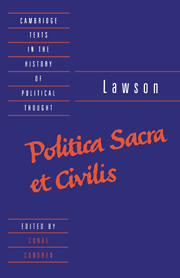Book contents
- Frontmatter
- Contents
- Preface
- Editor's introduction
- A note on the text
- Bibliographical guide
- Biographical notes
- Principal dates
- Politica Sacra et Civilis
- Epistle to the reader
- Dedicatory poem
- The arguments of the several chapters
- 1 Of government in general, and the original thereof
- 2 Of government in general, and of a community civil
- 3 Of an ecclesiastical community
- 4 Of a commonwealth in general, and power civil
- 5 Of the manner how civil power is acquired
- 6 Of power ecclesiastical
- 7 Of the manner of acquiring ecclesiastical power
- 8 Of the disposition of power civil, and the several forms of government
- 9 Of the disposition of ecclesiastical power: and first, whether it be due unto the bishop of Rome
- 10 Whether the civil state have any good title to the Power of the Keys
- 11 Whether episcopacy be the primary subject of the Power of the Keys
- 12 Whether presbytery or presbyters be the primary subject of the Power of the Keys
- 13 That the government of the church is not purely democratical, but like that of a free state, wherein the power is in the whole, not in any part, which is the author's judgement
- 14 Of the extent of a particular church
- 15 Of subjection in general, and the subjects of a civil state
- 16 Of subjects in an ecclesiastical polity
- Index
- Title in the series
9 - Of the disposition of ecclesiastical power: and first, whether it be due unto the bishop of Rome
Published online by Cambridge University Press: 05 June 2012
- Frontmatter
- Contents
- Preface
- Editor's introduction
- A note on the text
- Bibliographical guide
- Biographical notes
- Principal dates
- Politica Sacra et Civilis
- Epistle to the reader
- Dedicatory poem
- The arguments of the several chapters
- 1 Of government in general, and the original thereof
- 2 Of government in general, and of a community civil
- 3 Of an ecclesiastical community
- 4 Of a commonwealth in general, and power civil
- 5 Of the manner how civil power is acquired
- 6 Of power ecclesiastical
- 7 Of the manner of acquiring ecclesiastical power
- 8 Of the disposition of power civil, and the several forms of government
- 9 Of the disposition of ecclesiastical power: and first, whether it be due unto the bishop of Rome
- 10 Whether the civil state have any good title to the Power of the Keys
- 11 Whether episcopacy be the primary subject of the Power of the Keys
- 12 Whether presbytery or presbyters be the primary subject of the Power of the Keys
- 13 That the government of the church is not purely democratical, but like that of a free state, wherein the power is in the whole, not in any part, which is the author's judgement
- 14 Of the extent of a particular church
- 15 Of subjection in general, and the subjects of a civil state
- 16 Of subjects in an ecclesiastical polity
- Index
- Title in the series
Summary
The most difficult point in politics is that of the Jura Majestatis, and the right disposal of them in a fit subject. And concerning the nature of civil power, the manner of acquiring and disposing of it, I have already spoken; and also of ecclesiastical power and the acquisition thereof. Now it remains, [that] I say something of the manner of disposing the Power of the Keys in the right subjects. This is a matter of great dispute in these our times. Therefore, when I expected to find all clear, because a Jus divinum, grounded on the Scriptures, was pretended on all hands, I found it otherwise. As, when one of our worthies had disemboked the Magellanick Straits, and was entered into that sea, they call Pacificum, he found the word Pacifick really contradicted by violent storms. So it falls out here; I hoped to have landed in a region of perpetual peace, but I was found in a Terra del Fuego, a land of fire and smoke; like unto Palma, one of the seven Canary Islands, where, in September 1646, or thereabouts, a fire first raged fearfully in the bowels of the earth, and at length brake out, and ran in five several fiery, sulphurious streams into the main. In like manner, this Power of the Keys runs in five several channels, but very turbulently and impetuously. For the pope, the prince, the prelate, the presbyter, the plebeian rank, do every one of them severally challenge it; and nothing under a Jus divinum will serve the turn.
- Type
- Chapter
- Information
- Lawson: Politica sacra et civilis , pp. 126 - 130Publisher: Cambridge University PressPrint publication year: 1993



